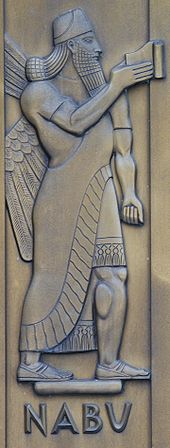Nabu
Template:Mesopotamian myth (Babylon)

Nabu is the Babylonian god of wisdom and writing, worshipped by Babylonians as the son of Marduk and his consort, Sarpanitum, and as the grandson of Ea. Nabu's consort was Tashmetum.
Originally, Nabu was a West Semitic deity introduced by the Amorites into Mesopotamia, probably at the same time as Marduk. While Marduk became Babylon's main deity, Nabu resided in nearby Borsippa in his temple E-zida. He was first called the "scribe and minister of Marduk", later assimilated as Marduk's beloved son from Sarpanitum. During the Babylonian New Year Festival, the cult statue of Nabu was transported from Borsippa to Babylon in order to commune with his father Marduk.
Nabu is accorded the office of patron of the scribes, taking over from the Sumerian goddess Nisaba. His symbols are the clay writing tablet with the writing stylus. He wears a horned cap, and stands with hands clasped, in the ancient gesture of priesthood. He rides on a winged dragon (mušhuššu, also known as Sirrush) that is initially Marduk's.
The etymology of his name is disputed. It could be derived from the root nb´ for "to call or announce", meaning something like "He who has called".
His power over human existence is immense, because Nabu engraves the destiny of each person, as the Gods have decided, on the tablets of sacred record. Thus, He has the power to increase or diminish, at will, the length of human life.
Nabu is mentioned in the Bible as Nebo in Isaiah 46:1 and Jeremiah 48:1.
A statue of Nabu from Calah, erected during the reign of Tiglath-pileser III is on display in the British Museum.
In late Babylonian astrology, Nabu was connected with the planet Mercury. As the god of wisdom and writing, he was equated by the Greeks to either Apollo or Hermes, the latter identified by the Romans with their own god Mercury.
![]() This article incorporates text from a publication now in the public domain: Easton, Matthew George (1897). Easton's Bible Dictionary (New and revised ed.). T. Nelson and Sons.
This article incorporates text from a publication now in the public domain: Easton, Matthew George (1897). Easton's Bible Dictionary (New and revised ed.). T. Nelson and Sons. {{cite encyclopedia}}: Missing or empty |title= (help)
